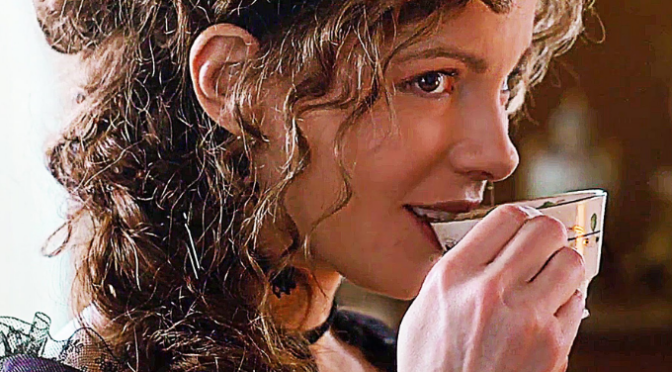If Whit Stillman’s filmography has taught us anything, it’s that when Kate Beckinsale and Chloë Sevigny come together for one of his scripts, the result is scintillatingly biting. Add Jane Austen into the mix and the formula becomes even more potent. Such is the case with Stillman’s fifth feature, Love & Friendship, a comedy of (ill) manners (as it always is with Stillman) that draws from one of Austen’s lesser read works, Lady Susan, published in 1871.
With Beckinsale in the eponymous role, Stillman manages to subtly recast her from 80s-era club girl/social climber Charlotte Pingress to an 18th century (the era during which Austen wrote the story) succubus with a polished air to conceal it. Her recent widowhood has forced her upon relatively hard times as she becomes more and more at the mercy of the whims of those whose homes she is visiting. The latest estate she’s finagled her way onto, that of Lord (Lochlann O’Mearáin) and Lady Manwaring (Jenn Murray), confirms all the rumors of Lady Susan’s voraciousness as Lady Manwaring exiles her away upon learning of her affair with Lord Manwaring. Incidentally, Lady Manwaring’s guardian, Mr. Johnson (Stephen Fry), is the husband of Lady Susan’s most trusted confidante, an American from Connecticut named Alicia Johnson (Sevigny). It is, indeed, only Alicia that Lady Susan can confide in, revealing the truest version of herself: that of the calculated older woman who toys with men and even her daughter, Frederica (Morfydd Clark), either for sport or to get something she needs.
But with only her sister-in-law, Catherine Vernon (Emma Greenwell), to rely on as a last resort for somewhere to “visit,” Lady Susan seizes the opportunity of Frederica’s recent expulsion from school to capitalize on the interest of a wealthy, but oh so simple man called Sir James Martin (Tom Bennett) of Martindale has in her daughter. Frederica, of course, is repelled by his feeble mind and general grotesquerie. But this is no matter to Lady Susan, who sees fit to occupy her days with the seduction of Catherine’s brother, Reginald DeCourcy (Xavier Samuel), an attractive man with the charm to lure Lady Susan and the sub-par brain to believe that he is her equal. As she ingratiates herself further into his heart, matters grow increasingly complicated as Frederica begins to make eyes at Reginald, using the damsel in distress (another Stillman movie) tactic to tell him that she doesn’t want to be married to James. So horrified to learn of the nature of Lady Susan’s parenting, and her lack of sympathy toward Frederica’s reluctance and despair over marrying such a man, Reginald informs his sister that he plans to leave Churchill that very day. Of course, his whims are no match for Lady Susan’s cunning (lingua). And where Lady Susan is concerned, every person has his purpose–whether for ephemeral pleasure or the use of his money.
As for Alicia, Sevigny makes subtler use of her character’s dialogue, proving Lady Susan’s compliment that she “has none of the uncouthness but all of the candor” of an American, which makes her an indispensable friend. Her sole objective, other than being amid the intelligent company of Lady Susan, is to avoid the threat her husband has made to ship her back to Connecticut from whence she came if she continues to fraternize with the unconscionable anti-heroine. But, naturally, to forbid someone from doing something only makes her want to do it more.
Lady Susan’s relationship with her daughter is perhaps one of the most fascinating elements of the narrative, and one that most closely aligns with the character of the novel. Even now, the innovation and anomalousness of a mother unmoved by her child is riveting. And it isn’t just that Lady Susan feels Frederica “has nothing to recommend her.” It’s that the uselessness of a child is not only a burden financially, but also one that drains a mother of her own fun quotient–though Frederica’s brief curveball of throwing a wrench in between her and Reginald is more titillating to Lady Susan than annoying.
Certainly, it’s no great feat for Lady Susan to reel Reginald back into her web–along with Lord Manwaring to boot. More than anything, Lady Susan is looking for the sort of man just oblivious (read: stupid) enough to allow her to carry on as she is while still affording her the lifestyle she’s accustomed to. That man, as Alicia so rightly points out, is very clearly James Martin. And while, as Alicia obsequiously (and accurately) points out that it would be easy for Lady Susan to keep Reginald on her hook, it would be the craftier, more prudent maneuver to use Martin for her own ends, rather than waste him on someone as impudent as Frederica.
And so, fundamentally, Love & Friendship is little about the meaning of the nouns presented in the title (extracted from the name of Jane Austen’s collected stories from the age of eleven to eighteen), but rather the superfluity of them, and how what lies beneath each is far more perverse. Stillman and Austen, thus, equate to a marvelous elucidation of ennui and subterfuge that made the “polite” society of the eighteenth century so tailor-made for Stillman’s singularly anachronistic voice.





















